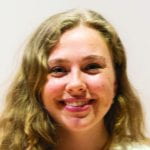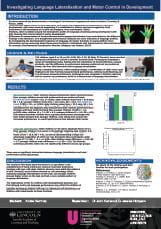by Amber Scotting //
 My project investigated the link between hand performance and preference to language laterality. It has long been thought that handedness and language are linked within the brain, so the current study aimed to use more in-depth tests of handedness, to investigate its complex nature. A dichotic listening task was also used to uncover childrens’ ear advantage, an indication of which hemisphere their language centre is located. Data collection was completed at the university’s Summer Scientist, which allowed us to get a large sample of children aged from 3 to 10 years old. This research will not only help to understand handedness throughout childhood development but also understand the link between handedness and language in people with impairments to these functions, such as Developmental Coordination Disorder.
My project investigated the link between hand performance and preference to language laterality. It has long been thought that handedness and language are linked within the brain, so the current study aimed to use more in-depth tests of handedness, to investigate its complex nature. A dichotic listening task was also used to uncover childrens’ ear advantage, an indication of which hemisphere their language centre is located. Data collection was completed at the university’s Summer Scientist, which allowed us to get a large sample of children aged from 3 to 10 years old. This research will not only help to understand handedness throughout childhood development but also understand the link between handedness and language in people with impairments to these functions, such as Developmental Coordination Disorder.
 Due to the research being conducted with children aged 3 to 10, some of the children did not have complete data; this was either due to the children being unable to complete the task or because they didn’t comply with the task. This was especially the case with the younger children in the sample as tasks such as coin turning proved difficult. This was expected as the project acknowledges the developmental trajectory of children, though it meant that for some children we could not fully examine their hand performance.
Due to the research being conducted with children aged 3 to 10, some of the children did not have complete data; this was either due to the children being unable to complete the task or because they didn’t comply with the task. This was especially the case with the younger children in the sample as tasks such as coin turning proved difficult. This was expected as the project acknowledges the developmental trajectory of children, though it meant that for some children we could not fully examine their hand performance.
Another problem we faced was establishing the preferred handedness of participants. This was especially a problem with younger children in the sample as it was often the case that these children had not yet started to write and as a result would know which hand they preferred. This also proved to be a problem with the line drawing task as participants were not aware of how to hold a pen.
 This helped me to understand the difference between research as part of a module and as a profession. This in turn will help me to go into my final year and approach my dissertation thinking in depth about the processes and decisions I will be required to make.
This helped me to understand the difference between research as part of a module and as a profession. This in turn will help me to go into my final year and approach my dissertation thinking in depth about the processes and decisions I will be required to make.
As I had two supervisors, I felt extremely supported during the project. Both Jess and John were always happy to support me in anyway and we would regularly catch up on where I was in the process, either in person or by email. Both supervisors were happy to answer questions about the research process, no matter how junior my enquiries were. The help I received during the project meant that I felt secure with the development on the project and that I was on track.
 UROS has given me an opportunity to gain more hands-on research experience. It has led to me to consider research in more of a professional sense, taking into account publication and the views of professionals in this academic field; this view was reiterated by my supervisors. Whether I want to work in clinical or experimental neuropsychology is still a decision I need to make but UROS has given me an insight into what working in psychological research would be like, which is extremely helpful in deciding my career path.
UROS has given me an opportunity to gain more hands-on research experience. It has led to me to consider research in more of a professional sense, taking into account publication and the views of professionals in this academic field; this view was reiterated by my supervisors. Whether I want to work in clinical or experimental neuropsychology is still a decision I need to make but UROS has given me an insight into what working in psychological research would be like, which is extremely helpful in deciding my career path.
*To view Amber’s project poster, please click on the thumbnail below:

